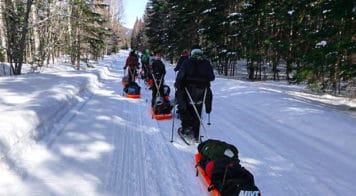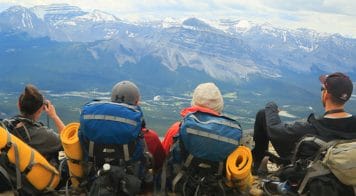Communicable Diseases
On May 5, 2023, after three years of the COVID-19 pandemic, the World Health Organization determined that “COVID-19 is now an established and ongoing health issue which no longer constitutes a public health emergency of international concern” (PHEIC). In that context, it is time for OBC to shift our health policies and procedures from a focus on COVID-19, to a general focus on preventing, mitigating, and treating communicable diseases on our programs and at our facilities. As there are currently several communicable diseases posing a threat to people in Canada, including COVID 19, influenza (flu), and Respiratory Syncytial Virus (RSV), OBC maintains a high level of vigilance.
The following information is shared from OBC’s Communicable Disease Protocol, which outlines our response to communicable diseases posing a threat to the people participating in our programs. Regional Safety Officers are responsible for ensuring protocol is followed as well as monitoring and regularly checking the instructions from their regional public health unit regarding diseases of concern for their region. Instructions given by public health units supersedes information laid out on this page in the event of disagreement.
Symptoms
If a student or staff member experiences a symptom that might indicate a communicable disease, this must be reported to the appropriate supervisor immediately. The person’s symptoms should be evaluated in terms of type and severity, and the person should be monitored at regular intervals until symptom free. This does not apply to mild symptoms that are attributable to a separate, previously diagnosed condition such as seasonal allergies. The action taken will depend on the type, severity, and duration of the symptoms. If two or more people at the same location experience Symptoms of Concern (see below), the situation should be reported to the regional health unit as a possible outbreak.
Mild Symptoms
- Mild cough
- Runny nose
- Mild tiredness
- Slight headache
- Sore throat
Symptoms of Concern
- Fever or chills
- Persistent cough
- Malaise or extreme tiredness
- Difficulty breathing
- Headache
- Body aches
- Nausea or vomiting
- Diarrhea
Symptoms at an OBC Base Facility
Any symptoms experienced by staff or students will be reported to the Regional Safety Officer immediately.
Staff or students who are experiencing mild symptoms (see above) may remain on base, providing they:
- Wear a mask
- Observe social distancing (keep 2m+ away from others)
- Do not prepare food for others
- Social distance from others when eating
Staff or students who are experiencing symptoms of concern (see above) should either return home or isolate at base, if the base has the capacity to support this. Anyone in isolation must:
- Remain in isolation until 24 hours after symptoms have resolved (48 hours for nausea, diarrhea or vomiting)
- Reside in a separate cabin or tent from others
- Eat separately from others. Precautions including the wearing of appropriate Personal Protective Equipment (PPE) such as medical masks and gloves should be taken to avoid contamination during the transfer of food to and from the patient
If symptoms of concern worsen or persist longer than 72 hours, the patient should return home and seek medical care. They may rejoin the program once they are symptom free.
Symptoms on an OBC Backcountry Field Program
Any symptoms experienced by staff or students will be reported to the Regional Safety Officer immediately.
Staff or students who are experiencing mild symptoms (see above) may remain on the course, providing they:
- Wear a mask
- Observe social distancing (keep 2m+ away from others)
- Do not prepare food for others
- Eat separately from others
Consider evacuation for staff or students who are experiencing symptoms of concern (see above). In some circumstances, with the approval of the Regional Safety Officer, it may be possible to isolate a symptomatic patient in the field.
Anyone in isolation must:
- Remain in isolation until 24 hours after symptoms have resolved (48 hours for nausea, diarrhea or vomiting)
- Sleep in a separate tent or shelter from others
- Maintain strict physical distancing
- Eat separately from others. Precautions including the wearing of appropriate PPE should be taken to avoid contamination during the transfer of food to and from the patient
If symptoms of concern worsen or persist longer than 72 hours, the patient should be evacuated to medical care. Those who wish to re-join the program must be symptom free.
All field courses should bring sufficient PPE. At a minimum, this means:
- One medical mask per person
- Two N95 or KN95 masks
- Five pairs medical gloves
Staff who are examining a symptomatic patient or administering first aid to a symptomatic patient will wear medical masks and gloves. Staff are strongly encouraged to wear appropriate PPE during other first aid situations.
All backcountry courses should have a tent plan that allows for isolation if necessary; eg: if using a group shelter or multiple person tent plan, consider packing one solo tent in addition, for isolation needs.
Vaccinations
As of January 11, 2023, we no longer require students or staff to be vaccinated against COVID-19.
We strongly recommend that all students and staff get vaccinated against COVID 19, seasonal influenza, and other diseases as recommended by their regional health authority.
Testing
As of May 5, 2023, we no longer require COVID-19 testing for our programs or facilities.
This protocol was reviewed and approved by OBC National Medical Advisor Dr. David Wong on June 8, 2023.






